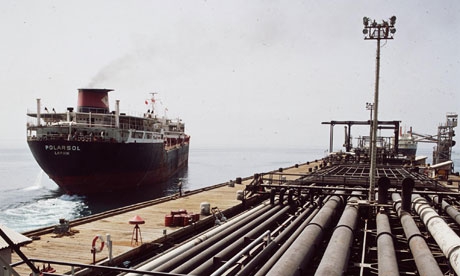
October trade data published this past Wednesday show that China�s imports of Iranian crude oil are down 23 percent from the year prior. Iran, in effect, has lost its standing to Russia as China�s number 3 crude supplier.�The Wall Street Journal�noted that, although China has previously defended its past trading volumes with Iran on the grounds that they were in line with all UN resolutions, its more recent withdrawal from Iranian purchases may be due to the looming threat of economic sanctions from the United States.
The United States has implemented economic sanctions on Iran in an effort to thwart its nuclear programs. Although officials in Tehran claim the program has purely peaceful intentions, various Western countries suspect its true purpose is to develop weaponry.
China already received exemption from these sanctions this past June. However, renewal this upcoming December is conditional upon even further reductions of Iranian imports. The Wall Street Journal speculated that the U.S. is likely to grant China�s request. For one, American leaders sympathize with the difficulty in finding substitutes for the heavy, sour crude that is produced specifically in Iran. Also, from a diplomatic perspective, it would be seen as unwise to make political waves in the immediate wake of China�s leadership transition.
Yuan Appreciation
This would not be only instance in which China has used economic means to ease diplomatic tensions with the United States. For instance, many have speculated that the appreciation of the Yuan within past years has not been a byproduct of mere market forces, but, rather, is China�s response to ongoing U.S. accusations of currency manipulation.
American politicians and economists have long argued that China�s competitive advantage stems from a deliberate suppression of its exchange rate. The Currency Exchange Rate Oversight Reform Act of 2011, which was approved by the U.S. Senate last year, sought to identify those nations with undervalued currencies and impose on them punitive trade tariffs. Although not mentioned by name, the bill clearly had China within its crosshairs. Outraged Chinese officials criticized the measure, claiming that it would be ineffective in achieving any economic benefit for U.S. citizens and would, instead, incite a costly international trade war.
Appreciation of the Yuan at the time was also cited as evidence of approaching exchange rate equilibrium. 2011 saw a nearly 4.8 percent gain for the Yuan against the dollar from the year prior (World Bank). Since 2001, the currency had advanced more than 28 percent.
The Currency bill was tabled and never received a vote from the House of Representatives. However, the issue of currency manipulation surfaced once again during the recent U.S. Presidential election when Republican nominee, Mitt Romney, accused President Obama of being too soft on China. Romney announced that, if elected, he would label China a currency manipulator with the promise of returning jobs to the States. Yet, a further appreciation of the Yuan makes this argument weaker, and may have even contributed in some degree to Obama�s reelection.
U.S. � China relations: Analysis
The two cases described may be perceived as China bending to the will of American policy makers. However, the case for this perspective is dubious and would be difficult to backup. One may argue that because of its large holdings of Treasury Bills, among other factors, China has just as much, if not more, economic leverage over the United States. Instead, the current situation may more aptly be characterized by China�s effort to maintain a delicate balance that exists with the U.S., the slightest disruption of which could result in the mutually assured destruction of the world�s two largest economies*. Going forward, cooperation between these two nations should prove fundamental to both of their financial well-being.
The Iran Project is not responsible for the content of quoted articles.











